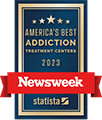Understanding Xanax Addiction
Learn About Xanax Abuse & Addiction
Xanax, also known as alprazolam, is an antianxiety medication that is classified as a benzodiazepine. Xanax is a depressant, meaning that it works to decrease activity within the central nervous system, allowing individuals to feel a sense of calmness. While Xanax is effective in helping those who struggle with anxiety disorders, there is potential for individuals to become addicted to this substance. When used for recreational purposes, Xanax brings about feelings of relaxation and pleasure, which is why this medication is often used in conjunction with other substances (such as stimulants) to help even out the effects of the drug. When abuse of this substance is ongoing, it is possible for an individual to become addicted to it. Fortunately, there are options for treatment that can help individuals defeat a Xanax addiction.
Statistics
Statistics of Xanax Abuse
According to the Diagnostic and Statistical Manual of Mental Disorders (DSM-5), 0.5 percent of individuals between the ages of 18 and 29 are likely to have abused prescription medications like antianxiety medications within a given year, with men being more likely to do so than women. The National Institute on Drug Abuse (NIDA) released data showing that 2.2 million people abused benzodiazepines like Xanax in 2010. The Substance Abuse and Mental Health Services Administration (SAMHSA) stated that emergency room visits for Xanax-related issues more than doubled within a recent span of six years, rising from over 57,000 in 2005 to roughly 124,000 in 2011.
Causes & Risk Factors
Causes & Risk Factors of Xanax Abuse
Researchers have recognized a variety of genetic and environmental causes and risk factors related to Xanax abuse, including:
Genetic: An individual’s genes can play a major role in whether or not he or she will develop Xanax use disorder. These genes often trigger a disorder such as this during adolescence and adulthood. Specific personality traits such as novelty-seeking behavior and impulsiveness can impact an individual’s vulnerability to partaking in Xanax abuse in the first place as well.
Environmental: A person’s environment can greatly impact whether or not an individual will come to abuse Xanax. Those who are prescribed this medication or those who have easy access to Xanax are more likely to abuse it than others. Furthermore, if an individual associates with peer who abuse this medication, there is a greater risk that that person will also come to experiment with Xanax.
Risk Factors:
- Age (individuals in their teens or twenties, as well as those older than 40 are most likely to abuse this substance)
- Personal history of substance abuse or mental illness
- Women are more at risk for Xanax abuse than men
- Family history of substance abuse or mental illness
- Easy access to Xanax
- Having poor impulse control or a strong desire for new experiences
Signs & Symptoms
Signs & Symptoms of Xanax Abuse
There are many signs and symptoms that can suggest a person is abusing Xanax. The following are examples of such signs and symptoms, of which may be observable by others:
Behavioral symptoms:
- Being unsuccessful in attempts to reduce one’s use of Xanax
- Taking more Xanax, or using for a longer period of time than intended
- Visiting multiple physicians in an attempt to obtain multiple prescriptions
- Investing a lot of time and energy into obtaining Xanax
- Continuing to abuse Xanax even when doing so can place an individual at risk of physical harm
- Giving up social, work, or recreational activities in favor of abusing Xanax
- Spending a great deal of time using Xanax or recovering from Xanax use
- Continuing to abuse Xanax even if one is experiencing significant psychological or physical problems as a result
- Not keeping up with home, work, or social obligations
Physical symptoms:
- Difficulty walking
- Poor coordination
- Slurred speech
- Loss of consciousness
- Needing a higher dose of Xanax in order to experience desired effects (also known as tolerance)
- Experiencing withdrawal, which is a number of uncomfortable symptoms that develop when an individual attempts to stop Xanax use
Cognitive symptoms:
- Difficulty paying attention
- Poor memory
- Having cravings or intense desires for Xanax
- Poor judgment
Psychosocial symptoms:
- Aggression
- Fluctuations in mood
- Experiencing significant social problems due to Xanax abuse
Co-Occurring Disorders
Xanax Abuse & Co-Occurring Disorders
Xanax abuse has the potential to cause serious destruction within an individual’s life. Some of these effects can include:
- Death
- Divorce
- Organ damage
- Loss of child custody
- Polysubstance use, addiction, or chemical dependency
- Onset or worsening of mental health symptoms
- Legal problems
- Relationship tension
- Decline in work performance
- Demotion or job loss
- Financial difficulties
- Vehicle accidents due to driving while high
Those who are diagnosed as having Xanax use disorder might also meet criteria of other mental health disorders, including:
- Antisocial personality disorder
- Anxiety disorders
- Bipolar disorders
- Depressive disorders
- Other substance use disorders
Effects of Withdrawal & Overdose
Effects of Withdrawal & Overdose From Xanax Abuse
Effects of Xanax withdrawal: When an individual who has been abusing Xanax recreationally attempts to stop his or her use, he or she might experience a number of symptoms known as withdrawal. These symptoms can include:
- Vomiting
- Nausea
- Tremors or shaking
- Sweating
- Rapid heartbeat
- Grand mal seizures
- Twitching or jitteriness
- Temporary hallucinations
- Anxiety
Effects of Xanax overdose: When an individual consumes more Xanax than his or her body is capable of metabolizing, an overdose can occur, which can be very serious and possibly even fatal. When an individual who has been abusing Xanax and/or other substances begins showing the following symptoms, immediate medical attention should be sought:
- Slowed breathing
- Unconsciousness
- Weakness
- Hallucinations
- Anxiety
- Loss of motor control
- Agitation
- Changes in vision
- Slurred speech







